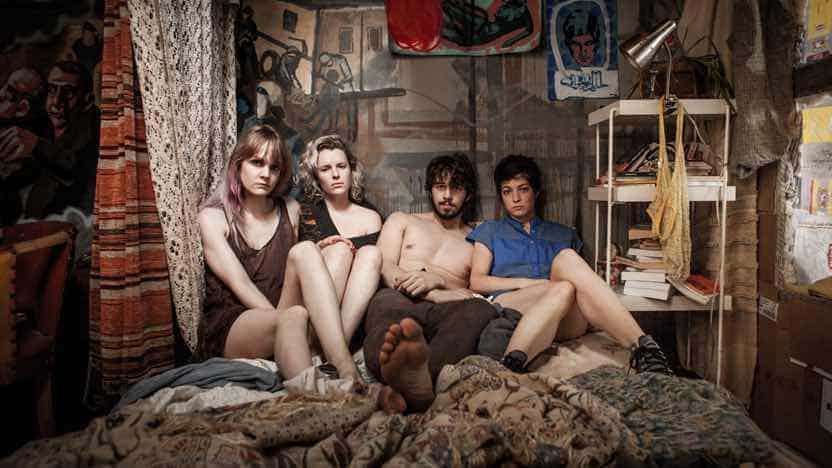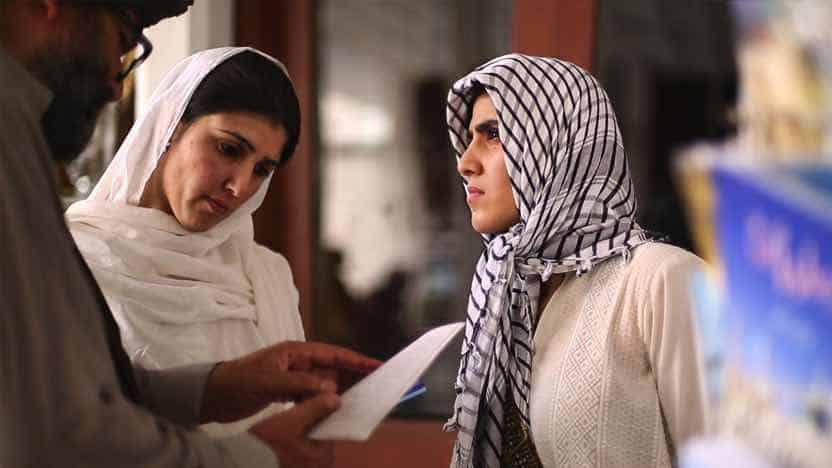For Bay Area cinephiles, the Frameline LGBTQ Film Festival is often an opportunity to catch up with queer films that previously screened at the San Francisco International Film Festival. But it’s also a chance for the films to find an entirely new audience.

Word of mouth boosted films like God’s Own Country, a surprise festival hit at Sundance that played to sold-out audiences at SFIFF. By the time it hit Frameline, the ticket-holder line and the rush line were around the block more than an hour before the film was set to start. The film also won the audience award for a narrative film. Similarly, the Sundance hit Beach Rats and the Irish crowd-pleaser A Date for Mad Mary, both of which had their SF premieres at SFIFF, screened again.
This year, Frameline brought several other critically acclaimed queer films from the festival circuit to town that might have been too niche to find an audience at a bigger festival. These included the much lauded South African film The Wound, about the Xhosa tribe’s male initiation ritual, and the Mexican film, I Dream in Another Language, in which a linguistic grad student seeking to preserve a dying Indigenous language stumbles on unspoken secrets from the past.
Those Who Make Revolution Halfway Only Dig Their Own Graves
I was particularly surprised to see the three-hour Canadian experimental film Those Who Make Revolution Halfway Only Dig Their Own Graves added to the program. When it premiered at the Toronto International Film Festival last year, it picked up the festival’s top prize for a Canadian film, causing critics to scramble to squeeze in this bizarre and inventive political film that had been easy to ignore beforehand. Challenging, intelligent, and surprisingly funny, it’s a rewarding experience but mostly only tangentially queer: one of the four student protagonists in the film is a trans woman. Still, it’s nice to see the film find an audience in the US at one of the foremost LGBTQ festivals.
Girl Unbound

Even more surprising was the inclusion of Canadian-American-Pakistani documentary Girl Unbound, which clumsily addresses gender norms and trans identities. The story itself is a remarkable one: Maria Toorpakai, a squash player from the Pakistani tribal region of Waziristan, moved to Canada to pursue the forbidden sport, after repeated death threats from the Taliban made it too risky to continue at home. As a child, Maria’s father and family had helped her dress and pass as a boy in order to have access to training camps and competitions. But as the film progresses, whether Maria identifies as male or female becomes murky, and the film’s title, which reasserts Maria’s girlhood, is especially problematic.
Smaller narrative films with less prestigious festival launchpads also screened at the festival. Two highlights, the Austrian film Seventeen and the Chicago-set Signature Move, were both directed by women. In Seventeen, Paula (Elisabeth Wabitsch) and her crush end up kissing and having sex with everyone but each other because they’re both too afraid to name and acknowledge their feelings. Internalized homophobia plays only a small role while teenage immaturity and avoidance is the driving force behind a series of aborted love triangles, mixed signals, and hurt feelings.
Signature Move

Signature Move is a story of a two first generation immigrant women whose one-night stand turns into something more, which grows complicated as they try to navigate their respective cultures. Zaynab (Fawzia Mirza) lives with her Pakistani mother and has yet to come out. Alma (Sari Sanchez) has a closer relationship with her Mexican mother and more experience on the dating scene — enough to have become a commitment-phobe who doesn’t quite know how to deal with her unexpectedly strong feelings for Zaynab. The film finds its sweet spot in how the pair navigate their relationships with each other and their families, finding common ground as outsiders in American culture. The characterizations otherwise are a bit thin, as is Zaynab’s wrestling subplot. But it’s the kind of small, subtle film that Frameline should be supporting.
After Louie

This year’s closing night film, After Louie, seems like the perfect choice to bridge the gap between the queer community of yore and the younger generation, which is the focus of the film itself. Although it lacks the aural and visual thoughtfulness of Beach Rats or God’s Own Country, After Louie is an often intelligent and, in this moment, important film that deals with generational differences in the gay community now.
Alan Cumming stars as Sam, a lonely, frustrated New York City artist with a propensity for younger men — and paying them for their sexual services. Twenty years on, Sam still hasn’t gotten over the death of his close friend and sometime partner William from AIDS, and becomes obsessed with using William’s story to make some kind of video installation. Nevertheless, he’s ignorant about modern HIV prevention and treatment — PreP is a foreign concept to Sam because he’s still stuck in the past. He’s a staunch believer in preserving queer hookup culture, even though his participation in it doesn’t seem to bring him much joy. When his gay friends announce they’ve just gotten married, he can’t even manage a half-sincere congratulations; he’s too angry that they’ve fallen for heteronormativity.
When Sam starts having regular casual sex with twentysomething Braeden (a strong Zachary Booth), who is in an open relationship with his HIV-positive boyfriend, Sam is forced to confront his own prejudices and dated thinking. He’s angry that Braeden doesn’t know what it was like to fight for gay rights while all his friends died and nobody cared. And he can’t see how those hard-won rights have transformed life for the next generation for the better. Sam isn’t particularly likable, but Cumming plays him with great empathy, finding a broken, complicated man beneath the abrasive surface.
Keep reading about great queer cinema…

Call Me by Your Name
Read Call Me by Your Name: A Special Issue, a collection of essays through which you can relive Luca Guadagnino’s swoon-worthy summer tale.

Portrait of a Lady on Fire
Read our ebook Portraits of resistance: The cinema of Céline Sciamma, the first book ever written about Sciamma.

God’s Own Country
Read God’s Own Country: A Special Issue, the ultimate ebook companion to this gorgeous love story.

